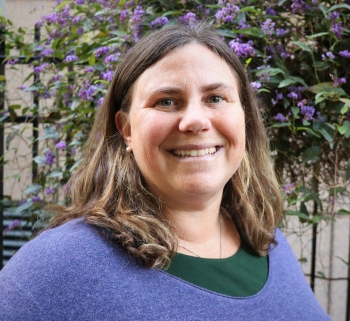Last month, StopWaste, via its Waste Management Authority Board, adopted a new set of Guiding Principles that will help guide programmatic strategy and budget development through 2021. The priorities use an adaptive approach to strategic planning, focusing our efforts where we can achieve the greatest results in support of our mission, stakeholders, and member agencies.
Agency Update - Winter 2019
Employee Spotlight

Jeanine Sidran
Senior Administrative Assistant
Jeanine Sidran joined the agency in 2008 as coordinator of the Education Center and field trip programs. She currently oversees public inquiries about recycling and reuse. She previously worked as the Education Director at the Hayward Area Historical Society, and in education and outreach at Lindsay Wildlife Experience, Bay Area Discovery Museum, and the Golden Gate National Recreation Area. Jeanine graduated from University of California Santa Cruz, pursued a Master’s in Cultural Anthropology from University of South Carolina and in Education from University of San Francisco, holds a Nonprofit Management Certificate from California State University East Bay, and is a Master Gardener and Master Composter.
What do you do at StopWaste?
When I first joined StopWaste, I ran the education center at the Davis St. Transfer Station and helped to open the education center at the Fremont Transfer Station. For the last six years, I have been connecting residents and businesses with the Agency’s resources and programs, specifically on where things go and how to keep things out of the landfill through projects like the mandatory recycling and reusable bag ordinances, and our online search tool, www.RecycleWhere.org.
What is your favorite part of working at StopWaste?
I love helping our residents and businesses practice the “4Rs” – reduce, reuse, recycle, rot/compost – and make it as easy as possible for them to follow through. It is a dream to work with talented colleagues who are passionate about being the change to make a difference in Alameda County through policy, outreach, and education.
How did you wind up at StopWaste?
Environmental education is my passion. I have researched seaweed in Peru, documented a dying Tibetan language in India, and worked as a SCUBA diver in the Aleutian Islands, Western Australia, and New Zealand. I grew up in museums, botanical gardens, and parks, and have chosen to work and volunteer in a few of them. The reason I took this job was to be able to reach as many kids (and now adults) as possible to teach them about the impact that our consumption and disposal choices have on the health of our planet.
What is one interesting thing that you like to share with others?
About seven years ago, Waste Management opened an old landfill cell at Davis St. Transfer Station and I got to help sort through it. There were newspapers from February 1976 that were perfectly intact and had stories of the Patty Hearst trial. What was also staggering was how perfectly preserved the grass clippings in the cell were – they were bright green, as though they had been trimmed just the other day.
What do you do when not working?
I volunteer in my twins’ school, classroom, and teaching garden, including serving as the Go Green co-chair, where I work on waste reduction and sustainability. I also love to thrift and rescue things for my family and friends, which extends to plants for my garden, food for my chickens, and animals (including a cat rescued from Davis St Transfer Station and a dog from Golden Gate Labrador Rescue). Mostly though, I spend my time doing laundry.


